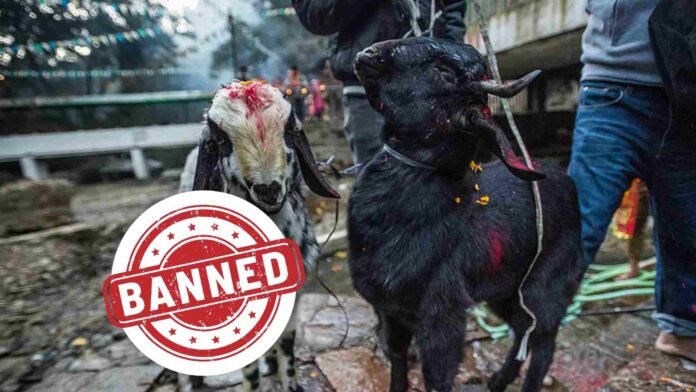The Madurai Bench of the Madras High Court has held that animal sacrifice at the Sikkandar Badhusha Dargah atop Thiruparankundram Hill is not a proven time-honoured custom, and that no new religious practices can be introduced at the sacred hillock without legal sanction.
Table of Contents
Delivering the verdict after a split decision by a Division Bench, Justice R. Vijayakumar observed that the Dargah administration failed to produce credible evidence establishing that Kandoori animal sacrifice was an established religious practice from time immemorial. He directed that such disputes be taken before a competent civil court and, until then, the practice should not be continued within the protected hill area.
The judgment came in response to three public interest litigations filed by devotees and Hindu organizations seeking to prohibit animal sacrifices on the hill; prevent renaming of the site as “Sikkandar Malai”; and stop prayers and gatherings at Nellithoppu, a pathway area leading to the Kasi Vishwanathar Temple.
The petitioners, S.Paramasivam asserted that there was no historical or religious precedent for animal sacrifice at the hilltop Dargah and that such practices began only in recent years. They contended that both the Prevention of Cruelty to Animals Act and the Archaeological Monuments and Sites Act, 1958 prohibit such activities in protected heritage areas.
Conversely, the Dargah Administration claimed that ritual animal sacrifices and communal feasts (Kandoori) have been performed for over a century, forming an essential part of their religious tradition. They argued that these practices promote interfaith harmony, with even local Hindus historically participating in the communal feast.
The District Collector and Police Commissioner supported the Dargah’s position by citing peace committee meetings that acknowledged the continuation of animal sacrifice as a long-standing practice. However, the ASI clarified that the entire 172.7-acre hillock, including the Dargah area, is a protected monument, where any animal sacrifice or cooking activity would constitute a legal violation.
The Temple Administration, meanwhile, reiterated that the entire hill belongs to the deity and that any ritual or construction activity at the top of the hill requires their consent.
Earlier, a Division Bench comprising Justice J. Nisha Banu and Justice S. Srimathy had delivered conflicting opinions.
Justice Nisha Banu held that animal sacrifice could not be prohibited since it was an established religious practice protected under Article 25 of the Constitution and that there was no current statutory ban after the repeal of the Tamil Nadu Animals and Birds Sacrifices Prohibition Act, 1950.
Justice Srimathy, however, held that there was no historical evidence of animal sacrifice at the Dargah, and such practices could not be newly introduced. She maintained that any dispute over customary rights must be established through a civil court and not assumed.
Following the split verdict, the matter was referred to Justice R. Vijayakumar for a final decision.
Core Issues Before the Third Judge
Justice Vijayakumar identified four main issues for determination:
- Whether animal sacrifice (Kandoori) at the Dargah is a time-honoured religious practice.
- Whether such a practice is protected under Article 25 of the Constitution.
- Whether authorities should prevent the renaming of Thiruparankundram Hill as Sikkandar Malai.
- Whether prayers or gatherings can be conducted at Nellithoppu, the area leading to the hilltop.
Findings of the Court
On Animal Sacrifice
The Court noted the absence of historical or documentary evidence proving that animal sacrifice was a continuous religious custom. The judge directed that such matters, being disputed questions of fact, must be determined by a competent civil court. Pending such adjudication, the Court discouraged any animal sacrifice within the hillock premises, citing the ASI’s restrictions on religious or sacrificial practices within protected monuments.
On the Name “Sikkandar Malai”
Justice Vijayakumar agreed with earlier civil court findings that the official and historical name of the hill is Thiruparankundram Hill. He observed that using alternate nomenclature such as “Sikkandar Malai” was a “mischievous attempt” and directed authorities to prevent any distortion of official records or public usage.
On Prayers at Nellithoppu
The Court held that the Dargah’s right of access to its premises does not extend to conducting public prayers or gatherings at Nellithoppu, especially when such activities interfere with temple pathways and devotees. It ruled that any new practice initiated recently cannot be allowed without authorization.
Case Details
Case Title: S.Paramasivam Versus The District Collector
Case No.: W.P.(MD)Nos.2678 & 2277 of 2025 and 15565 of 2023
Date: 10.10.2025
Counsel For Petitioner: G.Karthikeyan
Counsel For Respondent: J.Ravindran
Read More: Trump Alleges China’s “Hostile” Global Trade Move, Threatens Massive Tariffs in Response

